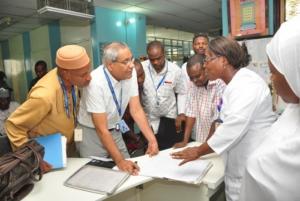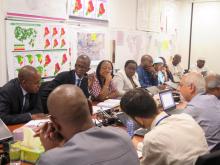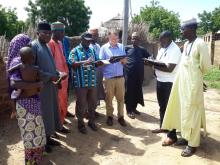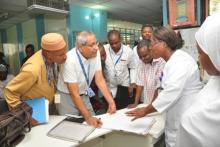External Experts Commend the Strong Surveillance Structure for detecting Outbreaks in Nigeria
Abuja 25 August 2016 - An international team for surveillance and outbreak response assessment lauds the government of Nigeria for establishing a strong surveillance system in the country. The team made this known at the presentation of their findings to the National polio Emergency Operations Centre (EOC) after 10 days of comprehensive review of the surveillance structure. The head of the assessment mission, Dr Arshad Quddus from WHO headquarters in Geneva, described the exercise as successful while commending Nigeria for maintaining a robust and functional surveillance network despite the complex security situation prevailing in the north eastern states.
The assessment set out to review the processes and functions of surveillance system at different levels in selected high risk states and FCT; assess overall sensitivity and quality of Acute Flaccid Paralysis (AFP) surveillance system and components of surveillance of other priority diseases with focus on Measles and neonatal tetanus (NNT).
Activities Conducted
The assessment team visited Kano, Kaduna, Sokoto, Borno and Federal Capital Territory (FCT). While in the field, the team interviewed State and LGA Disease Surveillance and Notification Officers (DSNOs), health facility focal persons, paediatricians, clinicians, ward nurses, physiotherapists, parents of AFP cases, community informants, and private practitioners. Sites visited included hospitals, health facilities, private hospital, houses of selected AFP cases, internally displaced people Camp and parents of one of the recent WPV cases in Borno state
While in Borno, the team’s visit was restricted to Maiduguri Metropolitan Council (MMC) and Jere LGAs. The team could not access other LGAs particularly the LGA where second case is located in Gwoza due to insecurity. Another limitation noted in the Borno assessment was a lack of accurate population estimates in inaccessible areas as well as IDPs
Key findings
The findings of the surveillance review team revealed that Nigeria has a robust and functional surveillance structure with widespread community based network of informants distributed in most wards including DSNOs, local government facilitators (LGAF), National surveillance Officers (NSO) and, health facility focal persons.
Coordination was sound at State and LGA levels between DSNOs, Local Government Facilitators (LGAF) and other surveillance team. The team however noted that forms, tools and guidelines were available with most of the DSNOs and health facility focal persons.
Clinicians, focal persons and informants were noted to have appreciable knowledge of AFP surveillance and have received regular training. The system of Integrated Disease Surveillance Reporting (IDSR) was also found to be functional with regular reports of measles, neonatal tetanus, yellow fever, cerebrospinal meningitis and others. More than 90% of the LGAs have met the 2 key indicators of non-polio AFP rate (NPAFP) and stool adequacy.
It was noted that AFP surveillance is supportive of measles, NNT, IDSR but require improvement and further strengthening of the surveillance system identified to include government ownership, supervision and monitoring
The report also raised concerns about the general quality of AFP surveillance and surveillance in IPDs camps. Evidence of gaps in active surveillance and the process of information documentation during initial investigation and validation were other areas of concerns. The report also highlighted that AFP surveillance in inaccessible areas of Borno is largely limited to IDPs camps within inaccessible or recently liberated LGA. The team concluded that a strong surveillance structure is in place to detect WPV outbreaks except in security compromised areas of Borno
Recommendations
Overall recommendations focused on ensuring frequency and quality of active surveillance; increasing national and state level supervision of high risk states and LGAs; strengthening government ownership of the surveillance system; and urgent review of the AFP verification in high risk states. They recommended to Nigeria to ensure that measles surveillance is fully integrated with AFP surveillance and ensure LGA surveillance officers regularly reviewed IDSR so as to avoid missing cases.
The team of experts outlined specific recommendations for Borno. Some of the recommendations include the establishment of a task force team to coordinate and monitor IDPs camps activities, urgent review of the AFP surveillance investigation and validation to ensure accuracy of data, conduct 60-days follow up for all AFP cases reported from IDPs camps for residual paralysis irrespective of their status, intensify engagement and sensitization of community informants, regular analysis and use of data for action and conduct quarterly surveillance review in the state.
The team further recommended establishing a functional collaborative system with the military, Civilian Joint Task Force (CJTF), NGOs and other UN agencies to strengthen surveillance.
The Incident Manager (IM) of National EOC Dr Usman Adamu expressed appreciation for the detailed report and assured the team that all recommendations will be implemented. He informed the team that government is working more closely now with the military to identify and report AFP cases in areas that are not accessible to civilians.
Speaking at the debriefing, the WHO Afro Polio Coordinator Dr Pascal Mkanda said the declaration of the outbreak of polio virus as public health emergency for countries in the Lake Chad Basin means that Nigeria, as a matter of urgency must implement coordinated outbreak response including surveillance intensification in order to quickly interrupt transmission by the end 2016 so as to avoid international spread
The WHO Nigeria EPI Team Leader Dr Fiona Braka assured the international experts that WHO will work with government to draw up action plans from the recommendations that will be implemented over the next three months. The plan she said will be done “in close communication with Borno EOC and respective states so as to ensure alignment”. The EOC will closely monitor implementation of the plan, she concluded.
The Rotary International Endowment Major Gift Advisor, Chris Offer expressed appreciation to all the thousands of polio workers for working tirelessly to eradicate polio and noted the solid confidence from rotary that Nigeria will stop transmission of the ongoing outbreak.
The debriefing was attended by representatives of the FMOH, NPHCDA, WHO, CDC, UNICEF, BMGF, CDC and other stakeholders.
The external surveillance assessment was conducted from the 15-25 of August in Nigeria by a team of experts from WHO Hq, UNICEF Hq, CDC Hq, BMGF and Rotary international (as an observer).
___________________________________________
For more information, please contact:
Technical contacts:
Dr Fiona Braka; Tel: +234 703 170 5252; Email: brakaf [at] who.int
Dr Ticha Johnson; Tel: +234 816 347 5205; Email: tichaj [at] who.int
Media contacts:
Kulchumi Hammanyero; Tel: +234 803 632 7360; Email:%20%20%20hammanyerok [at] who.int ( hammanyerok[at]who[dot]int )
Mustapha Umar Maiiyali; Tel: +234 803 616 9972; Email: %20%20%20umarm [at] who.int ( umarm[at]who[dot]int )
___________________________________________
01 Team Lead for surveillance assessment, Dr Arshad Quddus during field visit in Borno
02 From Left Regional Polio Coordinator Dr Pascal Mkanda Incident Manager NEOC Dr Usman Adamu Dep IMEunice Damisa EPI TL Dr Fiona Braka and WHO Surveillance Focal person Dr Ticha Johnson
03 In the middle Dr Graham Tallis WHO Hq, second left Mr Fadinding Manneh and Sokoto team during field visit






